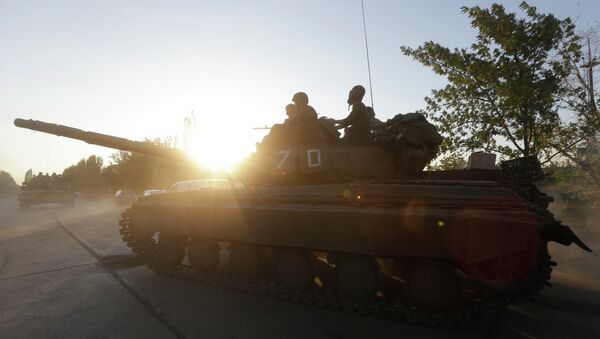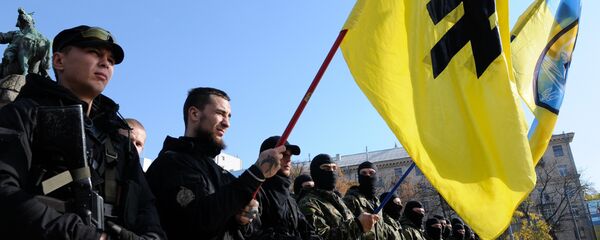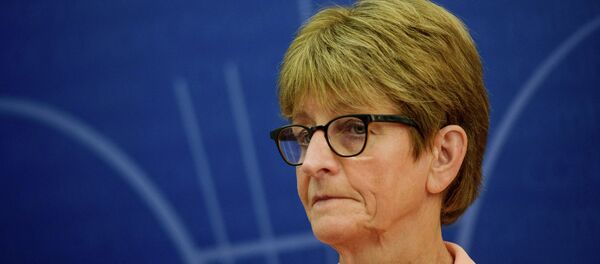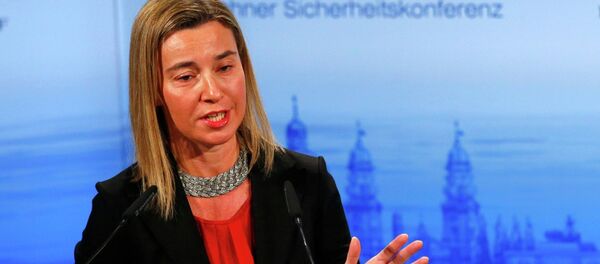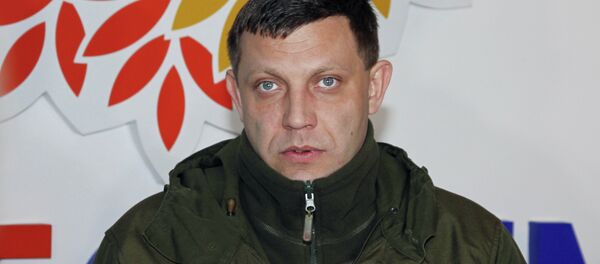MOSCOW (Sputnik) – The conflict in Ukraine can only end if Kiev holds direct talks with representatives of the southeast (Donbas), follows through with the Minsk agreements and puts an end to radical nationalism that has engulfed the country, Russian President Vladimir Putin has announced.
According to the Russian president, the most important condition for the stabilization of the situation in Donbas is an "immediate cease-fire and ending of a so called 'anti-terrorist', but in fact punitive, operation in the south-east of Ukraine".
"Kiev's attempts to exert economic pressure on Donbas and disrupt its daily life only aggravate the situation. This is a dead-end track, fraught with a big catastrophe," Putin stressed.
The Russian president added that Ukrainians need to "gather around the negotiating table" and Russia will continue to make efforts to facilitate "sustainable and direct contacts" between Kiev and the self-proclaimed people's republics of Donetsk and Luhansk (DPR and LPR).
However, according to Putin it "is evident that the crisis will continue until the Ukrainians themselves agree with each other. Until the unbridled radicalism and nationalism are finished with, and the society is consolidated around positive values and genuine interests of Ukraine".
The Russian president emphasized that human rights must be fully observed in Ukraine and the country's leadership needs to develop a "constitutional state system formula" that would provide for "a safe and comfortable living" of all Ukrainian citizens.
Despite the truce, fighting continued in Donbas and even intensified at the start of this year.
Moscow has stressed that the ongoing Kiev military operation against predominantly Russian-speaking southeastern Ukraine is fuelled by far-rights groups and aggressive nationalists.
Expressing deep concern over the alarming widespread outbursts of neo-Nazism in Ukraine, Russia called on all UN member-states to back a resolution against the glorification of Nazism in December of last year.
Ukraine, along with the United States and Canada, voted against the Russia-initiated UN General Assembly resolution.
Ukraine’s Militarization Troubling Amid Dreadful Economic Conditions
Russia is concerned by increased militarization in Ukraine, where Kiev forces continue their fight against independence supporters, especially considering the drastic economic situation in the country, Russian President Vladimir Putin has said.
"Ukraine is militarizing rapidly. We can judge by the statistics: in 2014, the Ukrainian military budget increased by almost 41 percent. This year, according to preliminary data, it will more than triple and reach more than $3 billion – which is about 5 percent of the country's GDP," Putin told the Egyptian Al-Ahram newspaper.
Amid massive debt, Ukraine has announced a new wave of mass mobilization.
"The situation in Donbas has aggravated dramatically. Ukrainian security forces resumed the bombing of Donetsk, Lugansk and other residential areas in the region. They are building up their military presence there," Putin told Al-Ahram adding that "there are calls for 'taking revenge' after summer 'military failures' and for a forceful 'Ukrainization of Donbas [predominantly Russian-speaking southeaster regions of Ukraine]'".
Putin added that Russia is "worried" by the build-up of Kiev forces in Ukraine's southeast, where the Ukrainian government launched a military operation against independence supporters last spring, but expressed "hope that common sense will prevail".
The Ukrainian government plans to carry out the ongoing mobilization in three waves, with the first held from January 20 and the second one set to begin in April. On January 29, Ukrainian President Petro Poroshenko said that Kiev had recruited 45,000 draftees over nine days of the mobilization.
Putin has stressed that many Ukrainians are dodging the mobilization by leaving for Russia to avoid being sent to the conflict zone as "cannon fodder".
Meanwhile Lavrov has stressed that the mobilization hampers the reconciliation efforts made by both the Contact Group on Ukraine and the Normandy Quartet.
Both formats have been dedicated to finding a diplomatic solution to the Ukrainian conflict, however, only a Contact Group meeting (held in September in the Belarusian capital, Minsk) has led to substantial results, namely, a ceasefire agreement and a memorandum specifying its implementation.
However, despite the Minsk truce, fighting continues in Donbas and has intensified at the beginning of this year.

